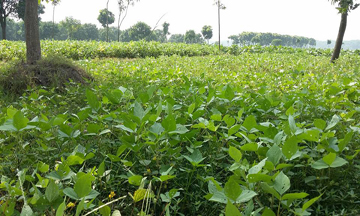RAJSHAHI, Nov 29, 2017 (BSS)- Farmers have been adopting a high yielding variety in mash-kalai (black gram) farming on their fallow lands in vast char (riverbed) areas of Rajshahi and Chapinawabganj districts for the last couple of years.
Department of Agriculture Extension (DAE) officials here said today the uses of BARIMASH-3, the high yielding variety released by Bangladesh Agriculture Research Institute (BARI), in mash-kalai farming are being gradually increased as per acre yield of this variety is much bigger than the existing indigenous varieties.
Huge char lands of the Padma and Mohananda rivers which remain fallow after monsoon for a long time are being brought under the mash-kalai farming with initiatives of Barind Station of On Farm Research Division (OFRD) of BARI.
Deputy Director of DAE Monjurul Huda said the farmers are very much interested to boost farming in the years to come as the variety’s yield is more than four to five mounds per bigha.
Shahmsul Islam, a farmer of Baliadaying village, said the farmers used to cultivate indigenous mash-kalai varieties in a scattered way in past and many of the lands remained fallow.
But after getting seeds from OFRD and according to its guidelines, they have been cultivating the new variety since the last year, he said, adding cost of farming on one bigha is around TK 800 whereas its outcome can fetch TK 7,500 to 8000.
Dr Shakhawat Hossain, Senior Scientific Officer and Head of OFRD Barind Center here told BSS that huge land of the char area remained fallow after receding floodwater every year. So, there is an enormous scope of farming this high yielding mash-kalai variety.
Terming it as an eco-friendly, he said the farming of this variety is most effective for boosting soil fertility. “Seeds were distributed among 200 farmers for cultivating on 100 acres of land in only Mohanpur area this season” he added.
The Rajshahi and Chapainawabganj districts along with their vast char areas are traditionally very much popular for mash-kalai farming.



